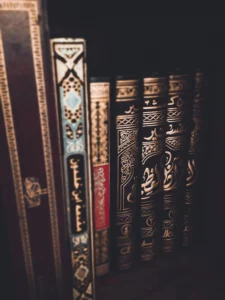Ummatics Colloquium | Waqf: Muslim Civil Society vs. the Nation-state
Our final colloquium of 2023 featured Dr. Riham Khafagy, Assistant Professor at the College of Humanities and Social Science at Zayed University (UAE). Dr. Khafagy presented on the role of the waqf and civil society organizations in the Muslim world and the West, drawing in part on her most recent book, Western Civil Society Institutions Are Messengers Of Values: A Reading Of Local And International Roles. In her talk, Dr. Khafagy attempted to unpack the tension between the nation-state and Muslim civil society, and explored the prospects of developing the waqf to reclaim its historical role in strengthening and uniting the Muslim Umma.
Dr. Khafagy began her talk by establishing a theoretical framework to distinguish between the Islamic and Western paradigms. She says that while the phrase “civil society” is common and widely used in the Islamic context, it has connotations that are more relevant to modern Western civilization. As Dr. Khafagy notes, the Western paradigm has three main sectors: the state, the market, and civil society. Civil society in this paradigm is the outcome of the interaction and power relations between the state and the market.
In the context of the Islamic paradigm, however, we find a different arrangement. In Islamic civilization, the concept of the Umma—not the state—is central, and it orients the actions, missions, and imperatives of Islamic society and social institutions. The state in the Islamic paradigm is, unlike the Western paradigm, not at the “top.” Rather it is both enmeshed within and directed by the lifeworld of the Umma—the core of the Islamic paradigm and source of both sovereignty, power, and institutional legitimacy.
The waqf, argues Dr. Khafagy, is a key institution within the Islamic paradigm. No legal authority can change or replace any of the activities of the waqf, except in limited circumstances, because of its total independence from the state and the market. It is (or in principle ought to be) a reflection of the donor’s will. What the waqf therefore provides us with is a unique model of sustainability that we do not find in the Western paradigm. This is evinced by the continued existence of certain waqfs across centuries, despite changes in the political arrangements of the Muslim world since the colonial era. Although the waqf as an institution experienced significant challenges during the colonial era, its legal independence served to protect it and help it continue into and beyond this historical period.
Dr. Khafagy adds that the waqf has both historical and contemporary applications of great significance. These include education, health care, social solidarity, and providing for the needy. Another important function of the waqf is securing funds for leaders and scholars to guarantee their independence. That being said, Dr. Khafagy clarifies that the emergence of the nation-state was a turning point in the history of the waqf because it posed unprecedented challenges to the institution. These include legal challenges (restrictions), bans, and confiscation of funds.
More recently, a “revival” of the waqf can be seen in pockets of the Muslim world. Since September 11, 2001, we have seen this occurring especially in the Gulf region, although significant activity can also been observed in North Africa—especially in Egypt and Tunisia. However, since this revival is occurring under the power of the nation-state, it ultimately takes the following two forms: administrative reform, and establishing philanthropic partnerships. There are, however, a number of internal and external challenges to this “revival,” according to Dr.
Khafagy. The internal challenges relate broadly to the criteria of good governance, and the external challenges relate to accountability and transparency, which pertain to the authority of the nation-state over the waqf. One of the important ways Dr. Khafagy believes we can tackle these problems is by being more deliberate in articulating both internal and external mission-based goals for our waqfs—both new and already existing.
An extended question and answer session followed Dr. Khafagy’s presentation. Among these questions, one pertained to the feasibility of reinvigorating the waqf as a robust and Umma-empowering institution without it playing into the hands of nation-states and their short-term interests. In response, Dr. Khafagy mentions that we are indeed still under the control of the nation-state today, which poses a challenge to the full and unimpeded revival of the waqf. That said, Dr. Khafagy predicts that non-state actors—political and social—are going to have a greater influence in years to come. In the long-term, this might act as a positive moderating force against the nation-state.
Another question raised the issue of what role can the nation-state might actually play for the benefit of the Umma, and whether the nation-state can aid the reinvigoration of the waqf system. Dr. Khafagy responded by saying that nation-states can indeed play a positive role by reconsidering, among other things, how they distribute funds both locally and internationally in a way that can empower their own locales and the international spaces of the Umma more broadly.
A question was also raised about Muslim minorities and their role in the West vis-a-vis the revival of waqfs, which was answered by Dr. Khafagy by noting that minorities indeed possess a great opportunity to operationalize new projects and help the reinvigoration of the waqf globally. They can not only organize waqfs based on Sharia friendly laws and rules, but do so in ways that are not possible in certain Arab countries today.
One of the final questions of the session had to do with whether the revival of the waqf should be an individual or collective obligation. In other words, is the revival of the waqf a civilization imperative of individual or collective proportions? Dr. Khafagy responded by evaluating the difficulties implicated in making it an individual responsibility, but noted we can still think about our own individual responsibilities within the context of the concept of fard kifaya. Dr. Khafagy ended the discussion by reminding us that, historically, the waqf has always been
domestic and local, and therefore it might be challenging to think about it in more global terms.
The challenge, in her view, is how to establish it locally but connect it globally.



